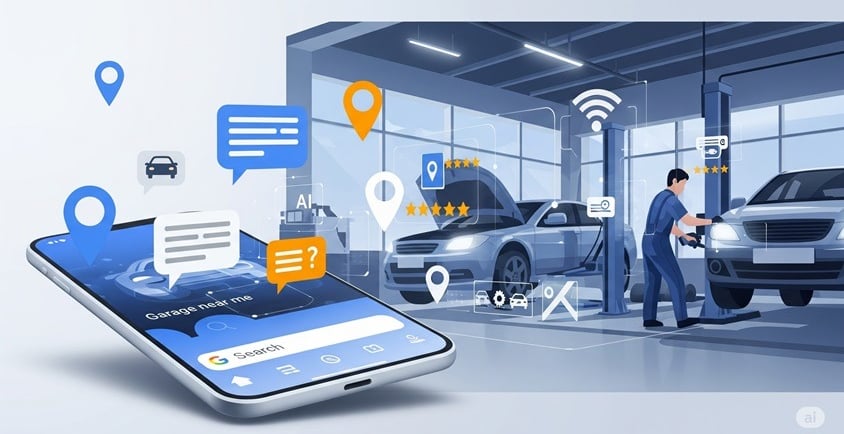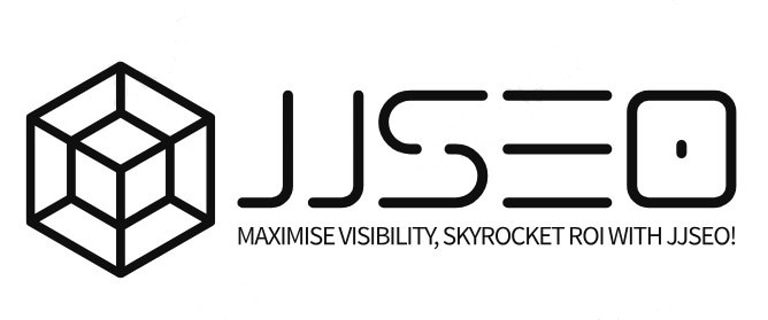Why Your Garage Needs AI Search Optimisation in 2025
Discover how AI overviews and zero-click searches are changing garage marketing. Learn practical SEO strategies by JJSEO to stay visible when customers need you most.
AUTOMOTIVE SEO
Jorge Jaroslavsky
8/11/20257 min read


Why Your Garage Needs to Adapt to AI Search Results (And How to Do It Right)
If you run an independent garage, MOT centre, or car repair shop, you've probably noticed something strange happening with your online enquiries lately. Customers are finding you differently than they used to. They're not browsing through multiple websites anymore—they're asking Google quick questions and making decisions based on what appears instantly.
This shift isn't just a minor change in customer behaviour. It's a fundamental transformation in how search engines work, driven by AI overviews and what the industry calls "zero-click searches." Understanding this change—and adapting to it—could mean the difference between thriving and struggling in today's competitive automotive market.
The New Reality: When Customers Don't Click
Recent studies show that up to 60% of automotive service searches now end without anyone clicking through to a website. Instead, Google's AI pulls together information from multiple sources to answer questions like "MOT near me," "how much does brake repair cost," or "garage open Sunday" directly in the search results.
This might sound alarming at first. If people aren't visiting your website, how can they become customers? But here's the thing: they're still making decisions. They're just making them based on the information that appears instantly in search results, AI overviews, and Google Maps listings.
The garages that understand this are getting more phone calls, more walk-ins, and more bookings than ever before. The ones that don't are becoming invisible, even when they're technically "ranking well" in traditional search results.
Why Traditional SEO Still Matters (But Isn't Enough)
Let me be clear: the fundamentals of good SEO haven't disappeared. Your Google Business Profile still needs to be complete and accurate. Your website still needs to be fast and mobile-friendly. You still need genuine customer reviews and consistent business information across all online directories.
But these basics are now just the entry fee. To really compete, you need to think about how AI systems and voice assistants find and present information about your garage.
The Five Foundations Every Garage Needs
1. Complete Google Business Profile Your profile needs every service listed specifically—not just "car repairs" but "brake repair," "clutch replacement," "diagnostic checks," "MOT testing," and so on. Include genuine photos of your workspace, staff, and recently serviced vehicles. Update your hours religiously, especially during holidays.
2. Service-Specific Pages Create dedicated pages for each major service you offer. Don't just have a generic "services" page. Have individual pages for "MOT Testing in [Your Area]," "Brake Repair [Your Town]," and "Emergency Car Diagnostics [Your Postcode Area]." Each page should answer the specific questions customers ask about that service.
3. FAQ Sections That Actually Help Build comprehensive FAQ sections that directly answer the questions you hear every day:
"How long does a full service take?"
"Can I wait while you do my MOT?"
"Do you provide courtesy cars?"
"What happens if my car fails its MOT?"
Structure these answers clearly and concisely. AI systems love pulling this type of information for instant answers.
4. Local Area Coverage If you serve multiple areas, create specific pages for each one. "Car Servicing in Moortown," "MOT Testing in Chapel Allerton," and so on. Make each page genuinely useful by including local directions, landmarks, and area-specific offers or testimonials.
5. Technical Foundation Ensure your website loads quickly on mobile devices, uses structured data markup (this helps AI systems understand your content), and maintains consistent business information across all online platforms.
How AI Search Actually Works for Garages
When someone searches for "reliable garage near me" or asks their phone "where can I get my car serviced today," AI systems don't just look at your website. They pull information from multiple sources:
Your Google Business Profile
Customer reviews across different platforms
Your website's FAQ sections
Directory listings
Local citations and mentions
Then they synthesise this information into a helpful answer. If your information isn't structured properly, or if it's incomplete or inconsistent, you simply won't appear in these AI-generated responses.
The "Answer Engine" Approach
Instead of just optimising for search rankings, successful garages now optimise to become the answer to customer questions. This means:
Writing in conversational language: Your content should sound like you're speaking directly to a customer, not like a corporate brochure.
Being specific about processes: Don't just say you do "car servicing." Explain what's included, how long it takes, and what customers should expect on the day.
Including practical details: Mention things like whether customers can wait on-site, if you provide courtesy cars, or if you offer same-day appointments for urgent repairs.
Structuring information clearly: Use bullet points, numbered lists, and clear headings. AI systems find it easier to extract and present well-structured information.
The Voice Search Revolution
More customers are using voice search, especially when their car breaks down and they need urgent help. They're asking questions like:
"Hey Google, find a garage that can see me today"
"Siri, how much does an MOT cost near me?"
"Where can I get my brakes checked in Leeds?"
To capture these searches, your content needs to match natural speech patterns. Instead of targeting keywords like "brake repair Leeds," think about full questions like "Where can I get my brakes repaired in Leeds?" and structure your content to answer them directly.
Real-World Example: How This Plays Out
Imagine two garages in the same area. Both offer similar services at similar prices.
Garage A has a basic website with a generic "services" page listing everything they do. Their Google profile has the basics filled in but hasn't been updated in months.
Garage B has dedicated pages for each service, complete with pricing guides, typical turnaround times, and clear answers to common questions. Their Google profile is regularly updated with fresh photos and accurate information. They've structured their content so AI systems can easily extract and present it.
When a customer's car breaks down and they search for "urgent brake repair near me," Garage B's information appears in the AI overview with specific details about their same-day availability, typical costs, and customer reviews. Even if the customer never clicks through to their website, they get the phone call because they were presented as the obvious choice.
Garage A, despite offering identical services, remains invisible because their information isn't structured for AI systems to understand and present.
Practical Steps to Get Started
Week 1: Audit Your Current Presence
Check how your garage appears in Google Maps
Review your Google Business Profile for completeness and accuracy
Search for your main services + your area and see what appears
Week 2-3: Fix the Basics
Update your Google Business Profile with all services and fresh photos
Ensure your business details are identical across all online directories
Create or improve your website's mobile experience
Month 2: Build Service-Specific Content
Create dedicated pages for each major service you offer
Add comprehensive FAQ sections to answer common customer questions
Include local area pages if you serve multiple locations
Month 3: Optimise for AI
Add structured data markup to help AI systems understand your content
Refine your content to match natural speech patterns and voice searches
Monitor how you appear in AI overviews and adjust accordingly
Ongoing: Maintain and Improve
Regularly update your Google Business Profile
Encourage and respond to customer reviews
Keep your service information current and accurate
The Measurement Challenge
Success in this new landscape isn't just about website visitors. You need to track:
Phone calls from Google listings
Direction requests to your location
Review volume and ratings
Visibility in local search results by postcode area
Mentions in AI overviews and featured snippets
These metrics often matter more than traditional website traffic for local service businesses.
When to Consider Professional Help
While many of these steps can be implemented independently, the technical aspects—particularly structured data markup, comprehensive content strategies, and ongoing optimisation for AI systems—require specialised knowledge.
The automotive SEO landscape changes rapidly, with new AI developments and algorithm updates appearing regularly. Many successful garage owners find that partnering with an experienced automotive SEO specialist allows them to focus on what they do best while ensuring their online presence keeps pace with these changes.
If you're considering professional assistance, look for someone who understands both traditional local SEO and modern AI-driven search. They should be able to explain their approach clearly and show you examples of how they've helped similar businesses adapt to these changes.
Looking Ahead: The Future of Garage Marketing
As AI and voice search continue evolving, the businesses that thrive will be those providing clear, authoritative answers to customer questions. Whether someone asks their smart speaker "Where's the best MOT garage near me?" or Google "How much does brake repair cost?", successful garages will be part of that conversation.
This isn't about gaming the system or using clever tricks. It's about being genuinely helpful and accessible to customers who need your services. The garages that embrace this approach don't just rank better—they build stronger relationships with their community and spend less time on unqualified enquiries.
Getting Your Strategy Right
The shift to AI-driven search represents both a challenge and an opportunity for independent garages. Those who adapt their online presence to match how customers actually search and make decisions will continue to thrive. Those who don't risk becoming invisible, no matter how excellent their mechanical skills.
The key is understanding that modern SEO for garages isn't just about your website—it's about your entire online presence across maps, directories, reviews, and AI systems. Every piece of information about your business needs to work together to present a clear, trustworthy, and helpful picture to potential customers.
Whether you tackle this transformation independently or work with a specialist, the important thing is to start adapting now. The automotive businesses succeeding in 2025 are those that recognised this shift early and positioned themselves as the obvious choice in an AI-driven search landscape.
For more insights on automotive SEO strategies, including approaches for independent car dealers, visit our automotive SEO resource centre. If you'd like to discuss how these changes might affect your specific business, our consultation services can provide tailored guidance for your situation.
The automotive industry is built on trust and expertise. In the digital world, that translates to being visible, accessible, and helpful exactly when customers need you most. Understanding and adapting to AI-driven search isn't just about marketing—it's about ensuring your expertise reaches the customers who need it.
Expertise
Driving organic traffic with tailored SEO solutions.
Growth
Results
Mail to: jj@jjseo.co.uk
© 2025 JJSEO. All rights reserved. | Expert SEO Consultant in Leeds
